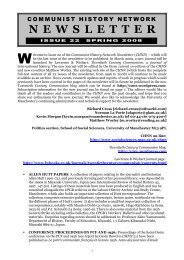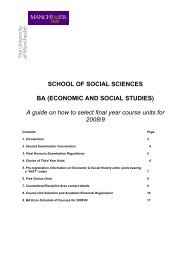POLI20532 Course Outline 1112 - School of Social Sciences
POLI20532 Course Outline 1112 - School of Social Sciences
POLI20532 Course Outline 1112 - School of Social Sciences
Create successful ePaper yourself
Turn your PDF publications into a flip-book with our unique Google optimized e-Paper software.
<strong>POLI20532</strong>: <strong>Course</strong> Guide 2011-12<br />
READING GUIDANCE AND GENERAL TEXTS<br />
A. STRUCTURE AND INTRODUCTORY COMMENTS<br />
There is a vast literature on British politics and society since 1940. Reading guidance is<br />
organised in the form <strong>of</strong> a weekly ‘Tutorial and reading guide’ as follows.<br />
1. Questions<br />
To be read at the outset as indicating key issues to be addressed through reading and class<br />
discussion.<br />
2. Essential readings<br />
Required readings for tutorial discussion unless your tutor specifies alternatives.<br />
3. General texts and alternative readings<br />
Further items directly supporting the lecture that except as stated should be readily<br />
accessible. Where applicable references are also given to the recommended course textbooks<br />
by Morgan and Childs (see further details below).<br />
4. Supplementary reading<br />
The course recommends a wide variety <strong>of</strong> readings, from polemical articles to extensively<br />
documented monographs. These need using with discrimination: one <strong>of</strong> the course objectives<br />
is to develop skills <strong>of</strong> using rigorously, critically and effectively the different types <strong>of</strong> source<br />
from which build up our understanding <strong>of</strong> politics. These skills may be particularly important<br />
for students writing dissertations in their final year. For this reason we do not specify a<br />
particular number <strong>of</strong> items that should be consulted, cited or listed in essay bibliographies. It<br />
is clearly important to familiarise yourself with alternative arguments and interpretations.<br />
Though you are not restricted to these, is also important that your reading is centrally based<br />
on the literatures recommended in the course guide and discussed in lectures and tutorials.<br />
Beyond this, you are encouraged to use insight and discretion as to how you follow up the<br />
different themes and lines <strong>of</strong> argument you encounter and credit for this will be given in<br />
formal assessment.<br />
5. Essay/exam preparation<br />
Except where this is clearly indicated, the course does not have a prescriptive approach as to<br />
specific texts or arguments to be cited in assessed essays or exam scripts. You are therefore<br />
encouraged to engage imaginatively with a variety <strong>of</strong> reading and show initiative in how you<br />
present your own understanding <strong>of</strong> the issues discussed. There are, however, core issues<br />
which it would be unwise to overlook and general parameters within which an effective<br />
*answer will need to be constructed. Appropriate guidance is therefore provided in each case.<br />
B. CONTEMPORARY SOURCES<br />
A vast range <strong>of</strong> contemporary sources in diverse media are easily accessed via the internet.<br />
These can give a vivid sense <strong>of</strong> how political debates were constructed at the time, which is<br />
one <strong>of</strong> the key themes <strong>of</strong> the course, and can enhance both understanding and enjoyment <strong>of</strong><br />
the issues discussed. Some suggestions for each topic will be made available on Blackboard 9<br />
at the same time as the relevant lecture slides. Recommendations are highly selective and just<br />
tip <strong>of</strong> the iceberg. Consultation isn’t a course requirement unless directed by your tutor as a<br />
form <strong>of</strong> class preparation.<br />
Another way <strong>of</strong> exploring some <strong>of</strong> the themes <strong>of</strong> the course is through the galleries <strong>of</strong><br />
Manchester People’s History Museum. This is one <strong>of</strong> the country’s leading museums <strong>of</strong><br />
social and political history and includes a wonderful collection <strong>of</strong> materials relating to the<br />
period covered in the course. Admission is free and the museum is well worth a visit (see<br />
7
















